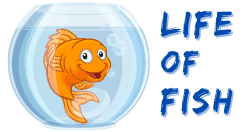You know that fish food is vital to your aquarium’s well-being. Fish food provides the necessary nutrients for the growth and survival of your fish. However, if you accidentally poured too much fish food into the water, it can lead to problems such as overfeeding and algae blooms.
In this post, we’ll share some tips on how to avoid accidentally pouring too much fish food into your tank!
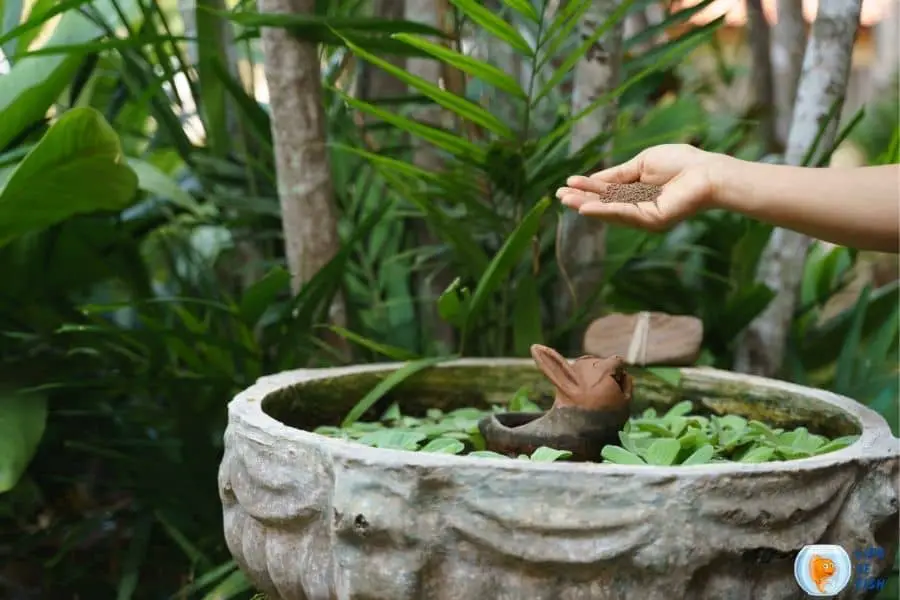
Eating Habits of fish
Jump To
- 1 Eating Habits of fish
- 2 How much should you feed fish?
- 3 How often should you feed fish?
- 4 How do I know if my fish are hungry?
- 5 What should I do if I accidentally poured too much fish food?
- 6 What happens if you feed a fish too much food?
- 7 Can too much food kill fish?
- 8 How do I get rid of excess fish food?
- 9 Does fish food dissolve in water?
- 10 How long does it take for fish food to turn into ammonia?
- 11 How many days can a fish go without eating?
- 12 Can fish recover from overfeeding?
- 13 Can I feed my fish once a week?
- 14 Conclusion
The eating habits and behaviors of fish are very different depending on the fish species.
Some, like puffers, eat mostly live prey, while others prefer to consume plants or other foods. However, almost every aquarium fish feed on fish pellets and flakes.
In the wild, fish eat whenever they are hungry, and their food supply is constant.
If they have plenty of food sources, they will eat several times per day. But, if they get a scarce food supply, they will go for days between meals.
So, as you see, fish are opportunistic feeders that will eat whenever they get a chance and as much food they can.
But in an aquarium, feeding them can be a bit trickier than that. As fish owners, we need to think about how much and how often we should feed our pets.
Aquarium fish quickly learn who feeds them daily and learn to “beg” food when they are nearby. But, don’t be fooled by this behavior because they might not be actually hungry.
While fish will eat almost everything you pour into the tank at any time, overfeeding can be a serious problem for your fish and the aesthetic look of your aquarium.
How much should you feed fish?
As a general rule, feed no more food than your fish will eat within five minutes.
There is nothing wrong with under-feeding, as fish are evolved to feed less than they need when necessary.
Overfeeding will cause algae growth in your fish tank due to increased nitrite and phosphate levels because of leftover food particles.
There is no one-size-fits-all feeding solution to how much you should feed your fish.
The amount varies depending on various conditions; number, types, and temperament of fish, aquarium size, filtration system (overfeeding can cause the mechanical filter to fail), and feeding habits of fish.
In other words, it can be a bit challenging to determine how much you should feed your fish!
So, overfeeding is the most common mistake in feeding aquarium fish. That is why we advise you to feed your fish enough to eat within 5 minutes and not a bit more.
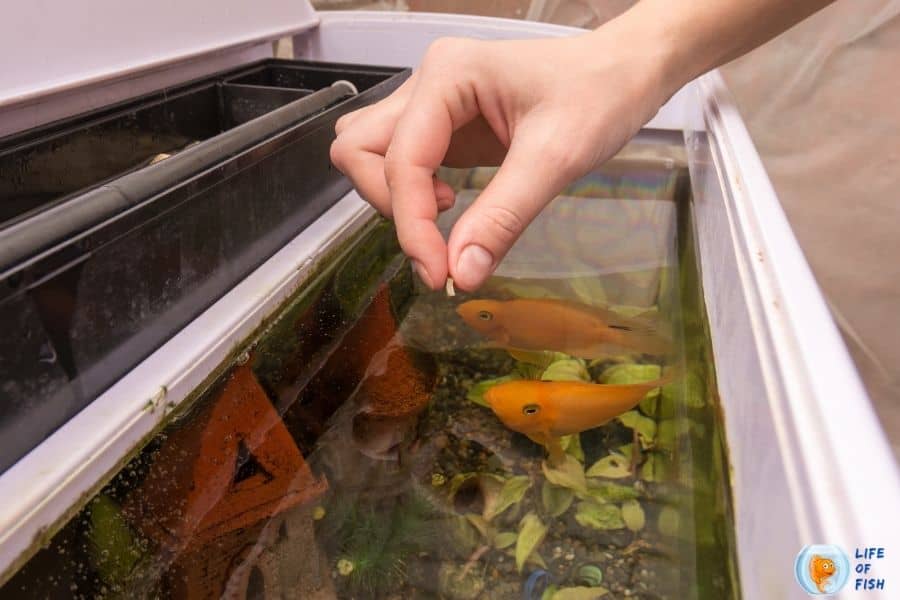
How often should you feed fish?
The most crucial requirement is not to overfeed when it comes to how often you should feed your fish. As a general guideline, feed your fish twice per day.
Most fish do well in only one feeding per day, but many aquarium owners prefer to feed at least twice daily. Of course, this feeding interval should change with the fish age.
Young, growing fish often need more than two meals per day because they eat more than adults.
Also, larger fish need to be fed more often than smaller ones. On the other hand, fish fry and small juvenile fish require frequent feedings of fry food for healthy growth.
However, You should keep in mind that young or small fish need smaller meals to avoid choking.
Herbivore freshwater fish like Silver Dollars, Mollies, and Farowellas can not hold on to one-meal-per-day rule as their tiny stomachs can not hold more food at once.
So, you may have to provide them with several feedings or supplement them with live plants inside the tank.
If you choose to feed your fish twice per day, then one of the meals should be smaller than the other.
If your pet is begging for food when you’re near the tank even though it just ate recently, don’t give in because this might be something fishes do when they see their owners.
It also means that you are overfeeding them, so try to improve your feeding habits and keep close attention on the amount of food you put in the tank.
How do I know if my fish are hungry?
It can be tricky to know if your fish are starving or just begging for food! You should look out for the following signs that indicate hunger:
- The fish approaches the surface of the water.
- The fish swims to the bottom, then returns to the top again.
- The outline of their stomach is visible.
If you are having trouble with your feedings, try cutting back the feeding time rather than volume. This way, they’ll learn that coming up every five minutes doesn’t work.
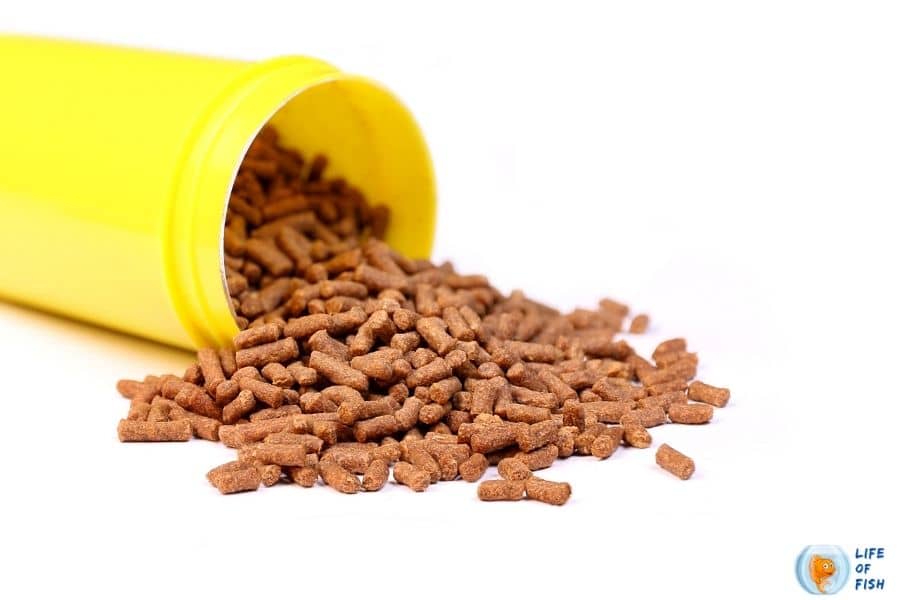
What should I do if I accidentally poured too much fish food?
If you (most likely a kid) accidentally pour too much fish food into the tank, you should remove the excess food almost immediately after your fish eat them for about 3 to 5 minutes.
Too much excess food can cause alarming amounts of ammonia and nitrite levels that can actually kill your fish within days.
So, immediate cleaning is necessary if poured too much fish food.
What happens if you feed a fish too much food?
If you feed your fish too much food, the tank water quality will decrease and get dirty because there is not enough oxygen and bacteria in the tank to break down waste or poop.
The leftovers can block your filter media and degrade into pollutants that are toxic to fish.
On the other hand, fish will eat more food than they require, which will lead to digestive problems and even death.
Even if they survive with those stomach issues, they will have to face bacterial infections such as fin rot as a result of water pollution.
The water will have ammonia spikes, poor oxygenation, low pH levels, and flatworms due to excess food that doesn’t decay and rot.
Can too much food kill fish?
Yes. Too much food can kill your fish. The leftovers can clog filters and decay into fish-toxic contaminants.
Fish, on the other hand, will overeat, causing stomach issues and even death.
Even if they survive the stomach difficulties, water pollution will cause bacterial infections like fin rot and parasitic infections like flatworms.
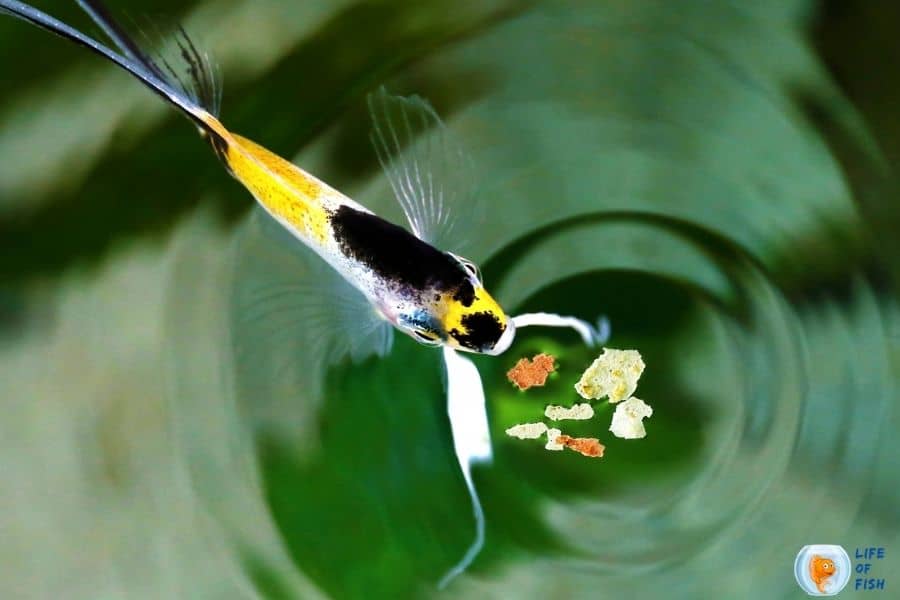
How do I get rid of excess fish food?
Remove uneaten food within 3 to 5 minutes! You can use a net to scrape the uneaten fish food on the surface of the water.
For food that fell down to the bottom of the tank, you will have to use an aquarium vacuum cleaner.
Siphon all the uneaten food without damaging your substrate and decorations.
In addition, you will have to use a water conditioner to detoxify the chemicals caused by decaying food.
Does fish food dissolve in water?
Fish food typically won’t dissolve in water because it contains insoluble materials like dried seaweed, spirulina, shrimp meal, and fresh grasses.
With that said, you can dissolve some ingredients (e.g., soluble proteins) by mixing the appropriate amount of hot water for 5 to 10 minutes.
How long does it take for fish food to turn into ammonia?
Generally, fish food will take 6 to 24 hours to break down into ammonia that could potentially harm your fish.
This is one of the reasons why you should always cut back on giving them more food than is necessary!
If you’re unsure when they last ate, feed them in intervals (every 5 minutes) and remove any uneaten food after 3 minutes from the fish tank.
Some types of foods like seafood and crab contain high protein levels and can give off toxic levels of ammonia faster than other types.
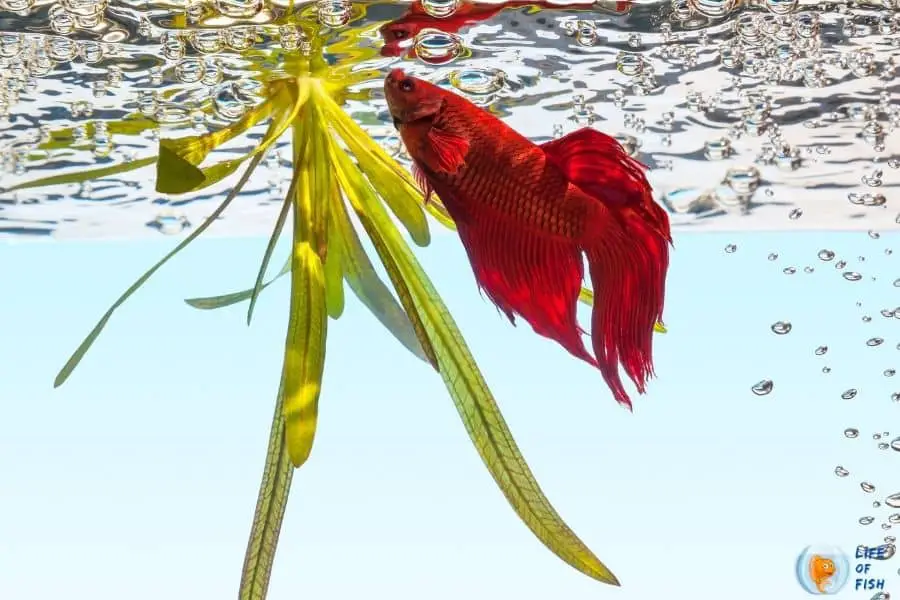
How many days can a fish go without eating?
It’s hard to say how many days a fish can go without eating, but it’s not impossible.
Occasionally they will go ‘between’ meals, which could range from hours (rarely) to days (less common).
Usually, when we feed them, they greedily eat all their food in seconds, but that doesn’t mean they are starving.
Generally, small fish can survive up to 14 days without any food, and larger fish can hold much longer. But, as a rule of thumb, we don’t skip feeding for more than two weeks.
Can fish recover from overfeeding?
Fish can recover from overeating, but it’s not as easy as just saying, “take it easy and relax.”
The worst that can happen to your fish by overeating is bloating due to bacterial infections.
You can treat bacterial infections with antibiotics while keeping the sick fish in a container with clean water and filtration.
At the same time, you can feed the fish with boiled and chopped peas as peas are a known cure for fish bloating.
Unfortunately, if you don’t see any improvement within days, the best humane solution is to euthanize the sick fish.
Can I feed my fish once a week?
You can skip feeding your fish for about one week once in a while, but doing this every week will lead to malnutrition and, eventually, death of the fish.
Therefore, it is not recommended to feed your fish only once per weak.
If you don’t have enough time to feed your fish every day, you can buy an automatic fish feeder that you can set up to feed your fish when you want.
If you have an automatic fish feeder, you can safely go on vacation for two weeks or so without worrying about your fishy friends.
However, you may also have to set up smart aquarium equipment to monitor your fish while away, as anything can happen when you are not around (such as breaking the filtration system).
Conclusion
Overfeeding is a common mistake every aquarist makes once in a while.
If you Accidentally Poured Too Much Fish Food into the aquarium, it’s essential to remove the excess food immediately before it leads to any problems with your aquarium or fish.
Fortunately, removing leftover food from an aquarium is easy and can be done using a net and an aquarium vacuum cleaner.
Read Next: How To Get Rid Of Copepods In Fish Tank? | Aquarit’s Secrets |
